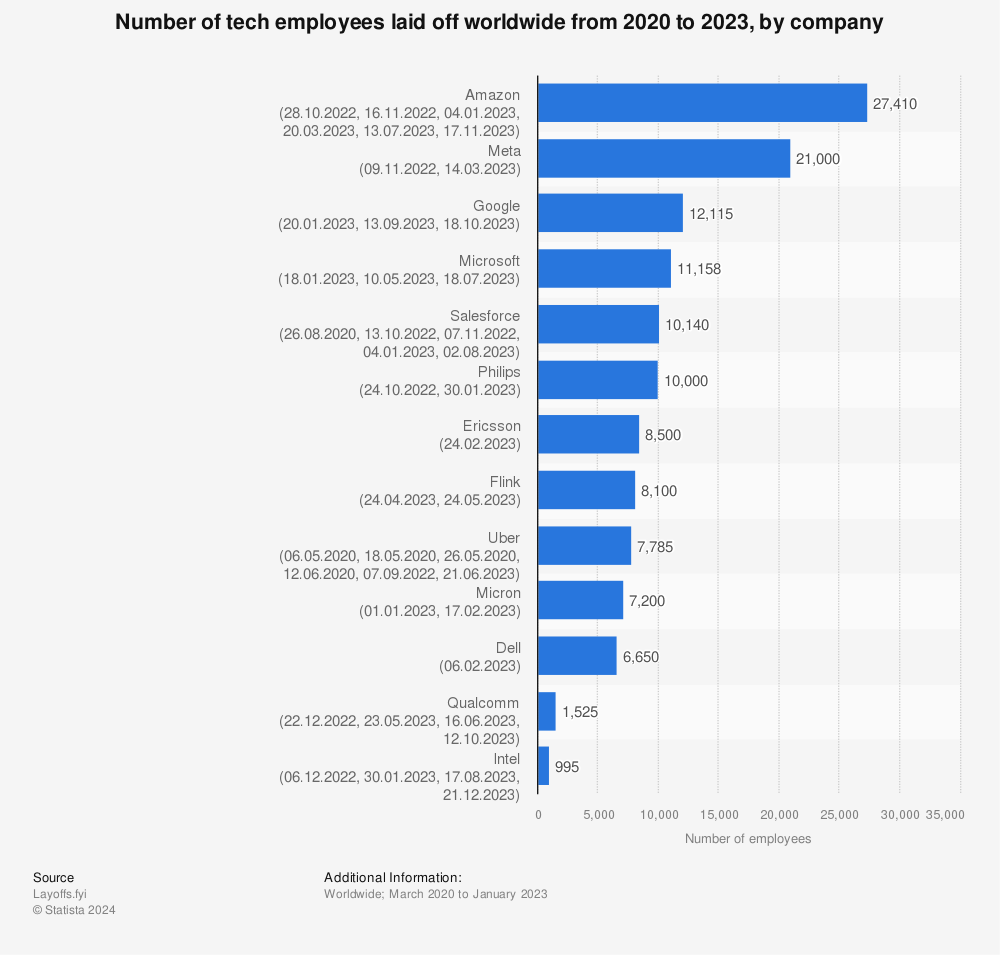Stay Valuable, Stay Employed: 4 Strategies for Layoffs Employees.
Make them Say We Need You!
Layoffs Employees Everywhere…Are you looking to secure your job and future-proof your career? If so, you’re in the right place. In this post, we’ll share four powerful strategies that will help you stand out as a valuable employee, no matter what’s going on in your company.
Table of Contents
ToggleBy implementing these proven tactics, you can show your employer that you’re a critical asset to the organization. From building strong relationships to demonstrating your initiative and flexibility, we’ll cover everything you need to know to stay valuable and employed, even during challenging times.
So, whether you’re feeling the pressure of potential layoffs or simply want to boost your job security, read on to discover how to stay valuable and indispensable to your employer. Let’s get started!
Layoffs Jobs from 2020
Layoffs due to the COVID-19 pandemic have increased across industries since 2020, but tech startups have been hit the hardest.
According to Statista, As of January 2023, Amazon had let go of 18,000 employees and Meta of 11,000. A total of 150 thousand employees worldwide lost their jobs by the end of 2022 with the majority being from US companies such as Amazon, Meta, and Twitter. The retail, finance, and education sectors were all adversely affected. Although the layoffs continue to increase, consumer tech startups have suffered disproportionately with almost 20,000 reported in mid-December 2022.
What are Layoffs? and Layoff Meaning
The term “layoff” is often used interchangeably with the term “Job loss” or “Downsizing.”
A layoff is the termination of employment of an employee due to a lack of work or funding, and it often occurs as part of a cost-cutting measure by a company.
In a layoff, employees are let go from their jobs and are typically eligible for unemployment benefits. Layoffs can be temporary or permanent, and they can affect a single employee or multiple employees.
The impact of a layoff can be significant, both on the affected employees and on the overall morale of a company.
Layoff VS Firing

Layoff and firings are two different ways of terminating an employee’s contract.
A layoff is initiated when a business needs to decrease staff size or struggles with a shortage of work or funding. It can affect one employee or several, and they may be eligible for unemployment benefits.
On the other hand, firing is generally the result of an employee’s misconduct or violation of company policies.
Firing is usually done on a case-by-case basis and does not guarantee eligibility for unemployment benefits.
In both a layoff and a firing, the affected employee is no longer employed by the company.
However, the circumstances and reasons for the termination of employment are different, which can have an impact on the employee’s eligibility for unemployment benefits and future job prospects.
4 Strategies to Stay Valuable, Stay Employed

The decision to lay off employees is typically made by a company’s management and is based on a variety of factors, such as budget constraints, the company’s overall financial situation, and the needs of the business.
To remain valuable employees and hopefully avoid the potential of a layoff, it is important to take proactive steps. Below are four strategies that potentially increase your chances to stay employed:
1. Supercharge Your Professional Performance
In today’s competitive job market, it is essential to consistently strive for excellence in your performance to stand out from the rest.
One of the best ways to do this is by ensuring that you are not only meeting but exceeding your job responsibilities and performance expectations. By doing so, you can demonstrate your value to the company and increase your chances of being recognized as a valuable asset to the organization.
Improving your performance doesn’t just benefit the company, but it can also benefit you in the long run. By demonstrating your ability to consistently deliver high-quality work, you can build a strong reputation within your organization and industry, which can open up new opportunities for career growth and advancement.
To improve your performance, it’s important to take a proactive approach. This means setting clear goals and objectives for yourself and regularly assessing your progress toward achieving them.
Additionally, seeking out feedback from your colleagues and managers can provide valuable insights into areas where you can improve and identify growth opportunities.
By taking the initiative to improve your performance, you can become an invaluable asset to your organization and set yourself up for long-term success in your career. So, whether you’re just starting in your career or looking to take your performance to the next level, remember that investing in yourself and your professional development can pay off in more ways than one.
2. The Power of Building Strong Relationships in the Workplace
Building strong relationships with your coworkers, supervisors, and other stakeholders in your company have become increasingly important. Not only does it foster a positive work culture, but it can also help to demonstrate your commitment to the company and increase your visibility to management.
Building relationships is essential for career growth and success.
A strong professional network can help you to gain new insights, ideas, and perspectives, as well as provide you with opportunities for advancement and career development.
To build strong relationships, it’s important to be genuine and authentic in your interactions with others. This means being a good listener, showing empathy, and being respectful of other people’s opinions and perspectives.
Additionally, finding common interests or hobbies with your coworkers can be an excellent way to connect with them on a personal level.
Another way to build relationships is by getting involved in company-sponsored activities or volunteer opportunities. These activities provide opportunities to interact with colleagues in a more relaxed setting and can help to build a sense of camaraderie and team spirit.
Overall, building strong relationships is an investment in your future success. So, don’t hesitate to reach out and start building those relationships today!
3. Flexibility: The Key to Thriving in the Modern Workplace
Flexibility is a crucial quality in the modern workplace, and it goes beyond just being able to adapt to new processes and technologies.
Being flexible means being open to new ideas, having the willingness to learn, and being able to take on new challenges. It also means having a positive attitude and being able to work collaboratively with others.
For example, imagine you work in a marketing department and your team is working on a new campaign. Suddenly, the project scope changes and your team has to pivot to a new direction. Instead of resisting the change or becoming overwhelmed, a flexible team member would see this as an opportunity to think creatively and come up with new ideas that could improve the campaign’s outcome. They would be open to feedback from their team members, be willing to change direction, and work collaboratively to get the job done.
Being flexible also means being able to take on additional responsibilities or projects when needed. For instance, if a colleague is out of the office, a flexible team member would be willing to step in and help out with their workload. They would take on the additional responsibility without complaint, knowing that it helps the team meet their goals.
Overall, being flexible is about having a growth mindset, being adaptable, and being willing to take on new challenges.
By demonstrating a willingness to learn and collaborate with others, you can become a valuable asset to your organization and position yourself for long-term career growth and success.
4. Beyond the Job Description: The Power of Proactivity in the Workplace
Being proactive can be the key to standing out and making a name for yourself within your organization. Rather than simply meeting the expectations of your current role, taking the initiative to seek out new opportunities or projects can demonstrate your ambition, drive, and commitment to the success of the company.
For example, let’s say you work for a large consulting firm, and you’ve been assigned to work on a project for a new client. While you’re confident in your abilities, you notice that certain skills or tools could help you deliver an even better result. Being proactive, you take the initiative to learn these new skills or tools and apply them to the project.
This not only demonstrates your ambition and commitment to delivering a high-quality result, but it also positions you as a valuable contributor to the project team.
Being proactive can also help you to gain new experiences, develop new skills, and expand your professional network. By seeking out new opportunities or projects within your organization, you can position yourself for career growth and advancement, and gain valuable experience that can benefit you in the long term.
Being proactive doesn’t mean stepping on others’ toes or overstepping your boundaries.
It’s important to approach new opportunities with a collaborative mindset, seek feedback and support from your team members, and ensure that your actions align with the company’s goals and values.
In summary, being proactive is an essential quality for success in today’s job market. By taking the initiative to seek out new opportunities and projects, you can demonstrate your ambition, commitment, and value to your organization.
Remember, many factors can impact a company’s decision to lay off employees, and it is impossible to completely exclude yourself from a layoff list.
However, by demonstrating your value and commitment to the company, you can potentially increase your chances of avoiding a layoff.
So stay valuable, stay employed, and look forward to a promising future!

